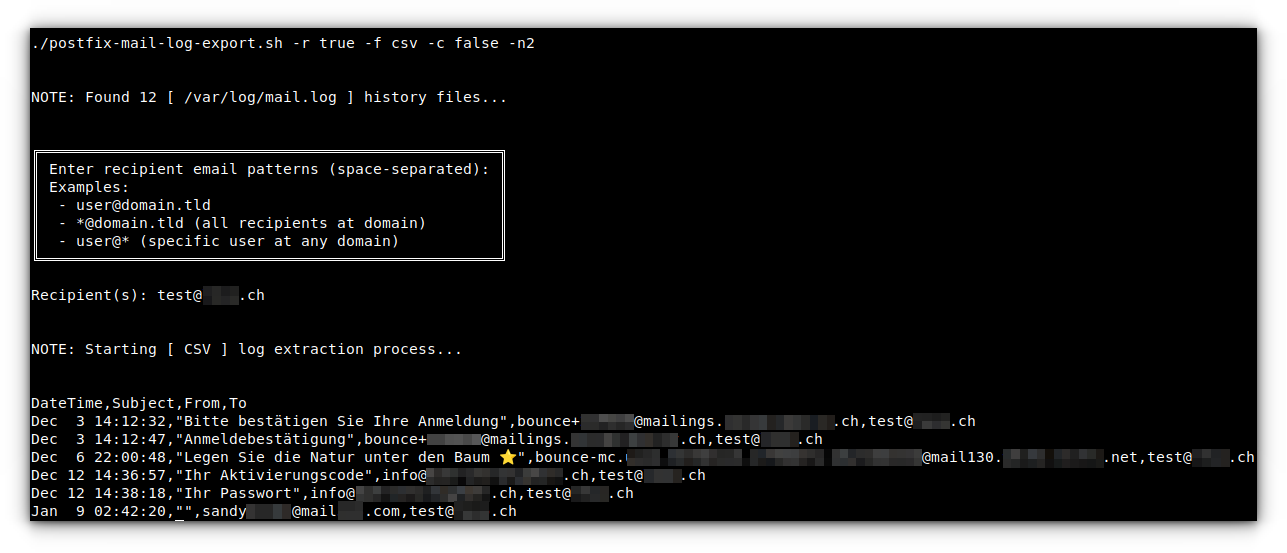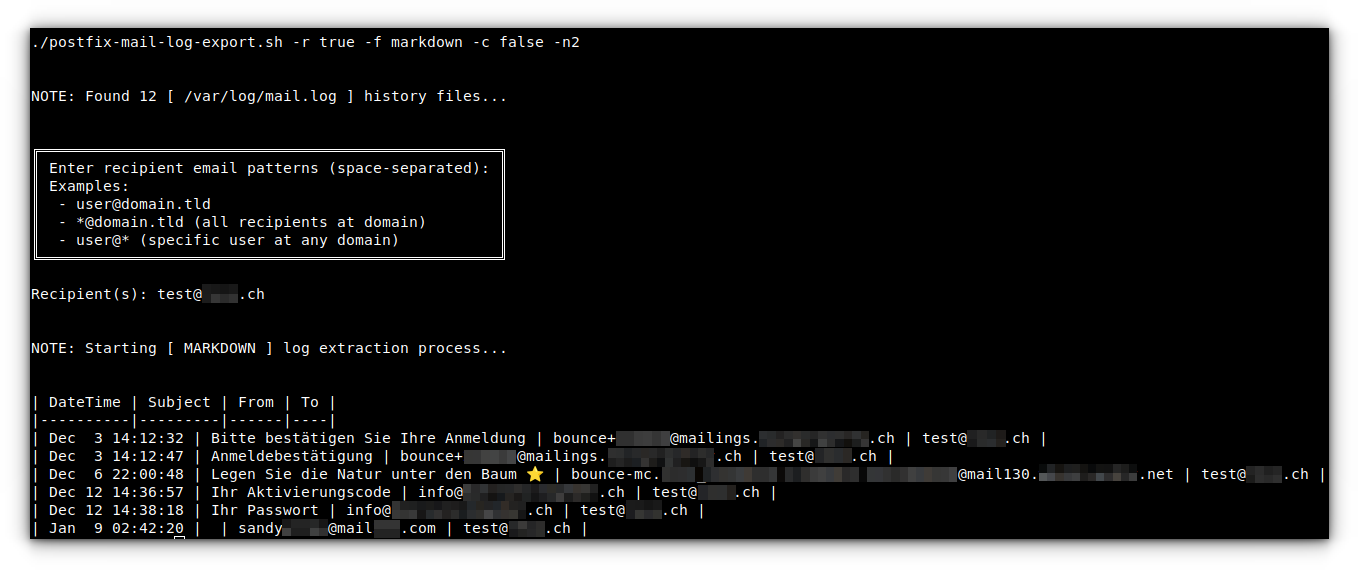
Categories
Money money money...
Could we help you? Please click the banners. We are young and desperately need the money



Export and Analyze Postfix Mail Logs as CSV or Markdown Table with Subject Lines Using Bash and Python



Export and Analyze Postfix Mail Logs with Subject Lines Using Bash and Python
Managing a mail server can be challenging, especially when you need to analyze email patterns or track specific communications. While Postfix provides robust logging capabilities, extracting meaningful information from these logs often requires complex parsing and processing. In this guide, we'll explore a powerful script that combines Bash and Python to extract and format mail log data, including email subjects, into easily analyzable formats.
Why Track Mail Logs with Subjects?
Email log analysis is crucial for various scenarios. System administrators and IT professionals frequently need to analyze mail logs for troubleshooting delivery issues, monitoring email patterns and volume, auditing email communications, investigating security incidents, and generating usage reports.
The default Postfix configuration doesn't include subject lines in logs, which can make these tasks more challenging. Our solution addresses this limitation while providing flexible export options that make data analysis straightforward and efficient.
Prerequisites and Setup
Before implementing the script, it's important to ensure your system meets all necessary requirements. Let's walk through each component needed for successful implementation.
System Requirements
Your server needs to have these core components installed and properly configured:
- Postfix mail server (installed and configured)
- Bash shell environment (standard on most Linux distributions)
- Python 3.x (for subject line decoding functionality)
- Basic command-line knowledge
- Root or sudo access for configuration changes
Required Python Modules
One of the advantages of our script is that it relies entirely on Python's standard library modules, requiring no additional package installation. The script utilizes these built-in modules:
- email.header - For handling MIME-encoded email headers
- quopri - For quoted-printable encoding support
- base64 - For base64 encoded content handling
- re - For regular expression operations
- codecs - For character encoding support
Configuring Postfix for Subject Logging
To enable subject line logging in Postfix, you'll need to make some configuration changes. Follow these steps carefully:
1. First, create or edit the header checks configuration file:
sudo mkdir -p /etc/postfix/maps/
sudo nano /etc/postfix/maps/header_checks.pcre2. Add this content to enable subject logging:
/^Subject:/ WARN3. Configure Postfix to use the header checks by editing the main configuration:
sudo nano /etc/postfix/main.cf4. Add or modify this line in main.cf:
header_checks = pcre:/etc/postfix/maps/header_checks.pcre5. Apply the changes by reloading Postfix:
sudo postfix reloadScript Implementation
Below is the complete implementation of our Postfix mail log export script. The script combines Bash for log processing and Python for robust subject line decoding:
#!/bin/bash
# ===========================================
# Postfix Mail Log Export Script
# ===========================================
# This script processes Postfix mail logs and exports email information
# into either markdown tables or CSV format. It supports processing of
# both current and historical (rotated) log files, with options to
# handle compressed archives.
# ===========================================
# Configuration Variables
# ===========================================
# Base path for mail log files. Rotated logs will be searched as:
# LOG_PATH.1, LOG_PATH.2.gz, etc.
LOG_PATH="/var/log/mail.log"
# Character used to wrap subject text in markdown output.
# This helps prevent conflicts with markdown table separators
# and makes the output more reliable when copy/pasting.
SUBJECT_SEP=""
# When true, subjects starting with '=' will be prefixed with
# a single quote. This prevents Excel/OpenOffice from interpreting
# the subject as a formula when importing the data.
QUOTE_EQUAL=true
# ===========================================
# Help Function
# ===========================================
show_usage() {
# Display script usage and available command line options
echo "Usage: $0 -r <include_rejected> -f <format> -c <case_sensitive> -n <history_count>"
echo "Options:"
echo " -r: Include rejected emails (true/false)"
echo " -f: Output format (markdown/csv)"
echo " -c: Case sensitive email matching (true/false)"
echo " -n: Number of history files to process (number or 'a' for all)"
exit 1
}
# ===========================================
# Command Line Argument Processing
# ===========================================
# Parse command line options using getopts
while getopts "r:f:c:n:h" opt; do
case $opt in
r) include_rejected=$OPTARG ;; # Control inclusion of rejected mails
f) output_format=$OPTARG ;; # Output format selection
c) case_sensitive=$OPTARG ;; # Email matching case sensitivity
n) history_count=$OPTARG ;; # Number of historic files to process
h) show_usage ;; # Show help
*) show_usage ;; # Invalid option
esac
done
# Verify all required arguments are provided
if [[ -z $include_rejected || -z $output_format || -z $case_sensitive || -z $history_count ]]; then
echo -e "\n\nERROR: Missing parameters\n\n"
show_usage
fi
# Convert output format to uppercase/lowercase for consistent comparison
include_rejected=${include_rejected,,}
output_format=${output_format^^}
case_sensitive=${case_sensitive,,}
# Validate the various formats...
if [[ $output_format != "MARKDOWN" && $output_format != "CSV" ]]; then
echo -e "\n\nERROR: Output format must be either 'markdown' or 'csv' (case insensitive)\n\n"
show_usage
fi
if [[ $include_rejected != "true" && $include_rejected != "false" ]]; then
echo "\n\nERROR: Include rejected must be either 'true' or 'false'\n\n"
show_usage
fi
if [[ $case_sensitive != "true" && $case_sensitive != "false" ]]; then
echo "\n\nERROR: Case sensitive must be either 'true' or 'false'\n\n"
show_usage
fi
# ===========================================
# Log File Discovery
# ===========================================
# Count available history files by incrementing counter
# until no more log files (plain or compressed) are found
max_history=1
while [ -f "${LOG_PATH}.${max_history}.gz" ] || [ -f "${LOG_PATH}.${max_history}" ]; do
((max_history++))
done
((max_history--))
echo -e "\n\nNOTE: Found $max_history [ ${LOG_PATH} ] history files...\n\n"
# Handle history file count selection
if [[ $history_count == "a" ]]; then
# Process all available history files
history_count=$max_history
elif [[ $history_count -gt $max_history ]]; then
# Adjust if requested count exceeds available files
echo "Warning: Only $max_history history files available. Using that instead."
history_count=$max_history
fi
# ===========================================
# Email Pattern Configuration
# ===========================================
# Prompt for and process email patterns
echo "╔═══════════════════════════════════════════════════╗"
echo "║ Enter recipient email patterns (space-separated): ║"
echo "║ Examples: ║"
echo "║ - user@domain.tld ║"
echo "║ - *@domain.tld (all recipients at domain) ║"
echo "║ - user@* (specific user at any domain) ║"
echo "╚═══════════════════════════════════════════════════╝"
echo ""
echo -n "Recipient(s): "
read -r recipients
# Convert email patterns into grep-compatible regex
email_patterns=""
for recipient in $recipients; do
# Add separator between multiple patterns
if [[ -n $email_patterns ]]; then
email_patterns+="|"
fi
# Convert wildcards to regex patterns and escape dots
recipient=$(echo "$recipient" | sed 's/\./\\./g' | sed 's/\*/.\*/g')
email_patterns+="($recipient)"
done
# ===========================================
# Subject Decoder Setup
# ===========================================
# Create temporary Python script for decoding email subjects
# This handles various character encodings and MIME formats
cat > /tmp/decode_subject.py << 'EOF'
import sys
import email.header
import quopri
import base64
import re
import codecs
def decode_subject(subject):
try:
subject = subject.replace('?==?', '?= =?')
parts = email.header.decode_header(subject)
decoded_parts = []
for part, charset in parts:
if isinstance(part, bytes):
if charset:
charset_map = {
'Windows-1252': 'cp1252',
'iso-8859-1': 'latin1',
'iso-8859-2': 'latin2',
'iso-8859-15': 'latin9',
'ks_c_5601-1987': 'cp949',
'GB2312': 'gb2312',
'big5': 'big5',
'shift_jis': 'cp932',
'euc-jp': 'euc_jp',
'koi8-r': 'koi8_r'
}
charset = charset_map.get(charset.lower(), charset)
decoded_parts.append(part.decode(charset, errors='replace'))
else:
decoded_parts.append(part.decode('utf-8', errors='replace'))
else:
decoded_parts.append(part)
result = ''.join(decoded_parts)
return result.strip()
except Exception as e:
return subject
if __name__ == '__main__':
if len(sys.argv) > 1:
print(decode_subject(sys.argv[1]))
EOF
# ===========================================
# Output Header Generation
# ===========================================
# Print appropriate header based on chosen format
echo -e "\n\nNOTE: Starting [ ${output_format} ] log extraction process...\n\n"
if [[ $output_format == "MARKDOWN" ]]; then
printf "| DateTime | Subject | From | To |\n"
printf "|----------|---------|------|----|\n"
elif [[ $output_format == "CSV" ]]; then
printf "DateTime,Subject,From,To\n"
fi
# ===========================================
# Log Processing
# ===========================================
# Process each log file, starting with oldest
for ((i=history_count; i>=0; i--)); do
# Determine current file path
current_file="${LOG_PATH}.${i}"
if [[ $i == 0 ]]; then
current_file="${LOG_PATH}" # Handle current log file
fi
# Choose appropriate cat command based on compression
if [[ -f "${current_file}.gz" ]]; then
cat_cmd="zcat"
current_file="${current_file}.gz"
else
cat_cmd="cat"
fi
# Process file if it exists
if [[ -f $current_file ]]; then
# Configure grep command based on case sensitivity
grep_cmd="grep -E"
if [[ $case_sensitive == "false" ]]; then
grep_cmd="grep -iE"
fi
# Configure rejection filter
reject_filter=""
if [[ $include_rejected == "false" ]]; then
reject_filter='| grep -v ": reject: "'
fi
# Process each matching line in the log file
eval "$cat_cmd '$current_file' | $grep_cmd 'from=<.*?>\\sto=<($email_patterns)>' $reject_filter" | while IFS= read -r line; do
# Extract datetime from log line
datetime=$(echo "$line" | cut -c1-15)
# Extract and decode subject
raw_subject=$(echo "$line" | grep -oP 'Subject: \K.*?(?= from [^ ]+\[|$)' | tr -d '\n')
# Decode MIME-encoded subjects
if [[ $raw_subject == *"=?"* ]]; then
decoded_subject=$(python3 /tmp/decode_subject.py "$raw_subject")
[ -z "$decoded_subject" ] && decoded_subject=$raw_subject
else
decoded_subject=$raw_subject
fi
# Handle subjects starting with equals sign
if [[ $QUOTE_EQUAL == true && $decoded_subject == "="* ]]; then
decoded_subject="'$decoded_subject"
fi
# Extract email addresses
from_email=$(echo "$line" | grep -oP 'from=<\K[^>]+')
to_email=$(echo "$line" | grep -oP 'to=<\K[^>]+')
# Output in selected format
if [[ $output_format == "MARKDOWN" ]]; then
# Escape markdown table separators in subject
decoded_subject=$(echo "$decoded_subject" | sed "s/|/\\|/g" | sed "s/\`/\\\`/g")
printf "| %s | %s%s%s | %s | %s |\n" \
"$datetime" \
"$SUBJECT_SEP" \
"$decoded_subject" \
"$SUBJECT_SEP" \
"$from_email" \
"$to_email"
elif [[ $output_format == "CSV" ]]; then
# Escape quotes in subject for CSV
decoded_subject=$(echo "$decoded_subject" | sed 's/"/""/'g)
printf "%s,\"%s\",%s,%s\n" \
"$datetime" \
"$decoded_subject" \
"$from_email" \
"$to_email"
fi
done
fi
done
# Cleanup temporary files
rm /tmp/decode_subject.py
Save this script as postfix-mail-log-export.sh and make it executable:
chmod +x postfix-mail-log-export.shScript Features and Capabilities
Our script offers a comprehensive set of features designed to make mail log analysis both powerful and flexible. Let's explore each major capability in detail.
Flexible Output Formats
The script provides two output format options, each serving different needs:
- CSV format - Perfect for detailed analysis in spreadsheet applications
- Markdown tables - Ideal for documentation and reporting
Advanced Email Matching
The pattern matching system supports sophisticated filtering options:
- Wildcard pattern support for flexible matching
- Case-sensitive or case-insensitive matching options
- Multiple recipient pattern matching in a single run
- Domain-specific or user-specific filtering
Robust Subject Handling
The script excels at handling complex email subjects:
- Automatic MIME-encoded subject decoding
- Support for multiple character sets and encodings
- Special handling for Excel-safe formatting
- Preservation of unicode characters
CSV Output
Markdown Table Output
Help output
Comparison with Other Solutions
| Feature | This Script | Manual Grep | Logwatch |
|---|---|---|---|
| Subject Line Support | Yes | Limited | No |
| MIME Decoding | Yes | No | No |
| Multiple Output Formats | Yes | No | Limited |
| Pattern Matching | Advanced | Basic | Basic |
Usage Examples
Let's explore some practical examples of using the script in different scenarios.
Basic Usage
Here's a basic command that covers most common use cases:
./postfix-mail-log-export.sh -r false -f csv -c true -n 1This command configuration:
- Excludes rejected emails (-r false)
- Outputs in CSV format (-f csv)
- Uses case-sensitive matching (-c true)
- Processes one historical log file (-n 1)
Advanced Pattern Matching
The script supports sophisticated email pattern matching that can handle various use cases:
user@domain.tld- Exact match for specific addresses*@domain.tld- Matches all recipients at a specific domainuser@*- Tracks a specific user across all domains
Multiple patterns can be combined by separating them with spaces when entering them at the prompt.
Common Issues and Solutions
While the script is designed to be robust, you might encounter some common issues. Here's how to address them:
Permission Issues
If you encounter permission-related problems:
- Verify the script has read access to all log files
- Use sudo when necessary for accessing system logs
- Check and adjust log file ownership and permissions
Encoding Problems
For character encoding-related issues:
- The script handles various character encodings automatically
- UTF-8 is recommended for all log files
- Additional charset mappings can be added to the Python decoder script
Performance Considerations
To optimize performance when working with large log files:
- Use the history count option (-n) to limit the scope of processing
- Consider running the script during off-peak hours
- Monitor system resources during execution
Maintenance and Updates
To ensure optimal performance and reliability, consider these maintenance aspects:
Regular Maintenance
Implement these maintenance practices:
- Regularly monitor log rotation settings to prevent excessive file buildup
- Check disk space usage, especially when processing multiple log files
- Update charset mappings as needed for new email sources
Script Updates
Keep the script current by:
- Reviewing and updating regex patterns for new email formats
- Adding support for new character encodings as needed
- Maintaining Python compatibility with system updates
Conclusion
This Postfix mail log export script represents a powerful solution for email log analysis, combining the flexibility of Bash with Python's robust text processing capabilities. Whether you're troubleshooting mail delivery issues or conducting security audits, this tool simplifies the process of extracting and analyzing email log data.
Remember to properly configure Postfix for subject logging and ensure all dependencies are met before implementing the script. With its flexible output options and powerful pattern matching capabilities, this script can significantly streamline your mail server administration tasks.
The combination of easy setup, powerful features, and flexible output options makes this script an invaluable tool for any system administrator working with Postfix mail servers. By following the installation and configuration steps outlined in this guide, you'll be well-equipped to handle various mail log analysis tasks efficiently.



